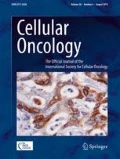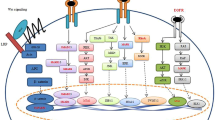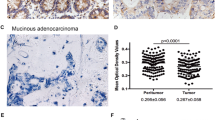Abstract
Purpose
Recurrence is a major cause of colorectal cancer (CRC)-related death. As yet, the accurate identification of CRC patients at high risk of recurrence is still a major clinical challenge. Previously, we found that an estrogen receptor (ER) pathway gene signature may predict disease recurrence in CRC patients. The aim of this study is to evaluate the potential application of additional pathway-specific gene signatures in the prediction of CRC recurrence.
Methods
The activities of 26 cancer-related pathways in CRC were semi-quantified using gene signature-based Bayesian binary regression analysis, and putative associations of the pathways with cancer recurrence risk were assessed using survival analysis.
Results
Among the 26 pathways tested, inactivation of the estrogen receptor (ER) pathway was found to be one of the most common events in CRC. Inactivation of this pathway was found to be frequently accompanied by over-activation of the BRAF/MEK pathway, and these two pathways were found to be associated with opposite effects on several clinicopathological CRC features, including microsatellite instability, subsite location, advanced stage and recurrence. Survival analysis of four independent CRC patient cohorts revealed that while the BRAF/MEK pathway was more strongly associated with recurrence than the ER pathway in mixed-stage CRCs, the ER pathway was a better predictor of recurrence than the BRAF/MEK pathway in stage II CRC. A combined use of these two pathways improved the prediction of CRC recurrence in both mixed stage CRC (n = 1122; overall HR: 2.518, 95% CI: 1.570–4.038, p < 0.001) and stage II CRC (n = 535; overall HR: 1.976, 95% CI: 1.306–2.989, p = 0.001).
Conclusions
Combined activity of the ER and BRAF/MEK pathways may represent a novel biomarker for CRC prognosis and clinical management.





Similar content being viewed by others
References
P. Favoriti, G. Carbone, M. Greco, F. Pirozzi, R.E. Pirozzi, F. Corcione, Worldwide burden of colorectal cancer: A review. Updat Surg 68, 7–11 (2016)
S.Banskota, S.Dahal, E.Kwon, D.Y.Kim, J.A.Kim, beta-Catenin gene promoter hypermethylation by reactive oxygen species correlates with the migratory and invasive potentials of colon cancer cells. Cell Oncol 41, 569–580 (2018)
K.M. Hardiman, Update on sporadic colorectal cancer genetics. Clin Colon Rectal Surg 31, 147–152 (2018)
K.M. Marks, N.P. West, E. Morris, P. Quirke, Clinicopathological, genomic and immunological factors in colorectal cancer prognosis. Br J Surg 105, e99–e109 (2018)
A.R. Sepulveda, S.R. Hamilton, C.J. Allegra, W. Grody, A.M. Cushman-Vokoun, W.K. Funkhouser, S.E. Kopetz, C. Lieu, N.M. Lindor, B.D. Minsky, F.A. Monzon, D.J. Sargent, V.M. Singh, J. Willis, J. Clark, C. Colasacco, R.B. Rumble, R. Temple-Smolkin, C.B. Ventura, J.A. Nowak, Molecular biomarkers for the evaluation of colorectal cancer: Guideline from the American Society for Clinical Pathology, College of American Pathologists, Association for Molecular Pathology, and American Society of Clinical Oncology. J Mol Diagn 19, 187–225 (2017)
Cancer Genome Atlas Research Network, Comprehensive genomic characterization defines human glioblastoma genes and core pathways. Nature 455, 1061–1068 (2008)
P.H. Hoang, S.E. Dobbins, A.J. Cornish, D. Chubb, P.J. Law, M. Kaiser, R.S. Houlston, Whole-genome sequencing of multiple myeloma reveals oncogenic pathways are targeted somatically through multiple mechanisms. Leukemia 32, 2459–2470 (2018)
F. Sanchez-Vega, M. Mina, J. Armenia, W.K. Chatila, A. Luna, K.C. La, S. Dimitriadoy, D.L. Liu, H.S. Kantheti, S. Saghafinia, D. Chakravarty, F. Daian, Q. Gao, M.H. Bailey, W.W. Liang, S.M. Foltz, I. Shmulevich, L. Ding, Z. Heins, A. Ochoa, B. Gross, J. Gao, H. Zhang, R. Kundra, C. Kandoth, I. Bahceci, L. Dervishi, U. Dogrusoz, W. Zhou, H. Shen, P.W. Laird, G.P. Way, C.S. Greene, H. Liang, Y. Xiao, C. Wang, A. Iavarone, A.H. Berger, T.G. Bivona, A.J. Lazar, G.D. Hammer, T. Giordano, L.N. Kwong, G. McArthur, C. Huang, A.D. Tward, M.J. Frederick, F. McCormick, M. Meyerson, E.M. Van Allen, A.D. Cherniack, G. Ciriello, C. Sander, N. Schultz, Oncogenic signaling pathways in the Cancer genome atlas. Cell 173, 321–337 (2018)
A. Loboda, M. Nebozhyn, R. Klinghoffer, J. Frazier, M. Chastain, W. Arthur, B. Roberts, T. Zhang, M. Chenard, B. Haines, J. Andersen, K. Nagashima, C. Paweletz, B. Lynch, I. Feldman, H. Dai, P. Huang, J. Watters, A gene expression signature of RAS pathway dependence predicts response to PI3K and RAS pathway inhibitors and expands the population of RAS pathway activated tumors. BMC Med Genet 3, 26 (2010)
D. Liu, Gene signatures of estrogen and progesterone receptor pathways predict the prognosis of colorectal cancer. FEBS J 283, 3115–3133 (2016)
M.L. Gatza, J.E. Lucas, W.T. Barry, J.W. Kim, Q. Wang, M.D. Crawford, M.B. Datto, M. Kelley, B. Mathey-Prevot, A. Potti, J.R. Nevins, A pathway-based classification of human breast cancer. Proc Natl Acad Sci USA 107, 6994–6999 (2010)
A.H. Bild, G. Yao, J.T. Chang, Q. Wang, A. Potti, D. Chasse, M.B. Joshi, D. Harpole, J.M. Lancaster, A. Berchuck, J.A. Olson Jr., J.R. Marks, H.K. Dressman, M. West, J.R. Nevins, Oncogenic pathway signatures in human cancers as a guide to targeted therapies. Nature 439, 353–357 (2006)
J.T. Chang, C. Carvalho, S. Mori, A.H. Bild, M.L. Gatza, Q. Wang, J.E. Lucas, A. Potti, P.G. Febbo, M. West, J.R. Nevins, A genomic strategy to elucidate modules of oncogenic pathway signaling networks. Mol Cell 34, 104–114 (2009)
M.L. Gatza, H.N. Kung, K.L. Blackwell, M.W. Dewhirst, J.R. Marks, J.T. Chi, Analysis of tumor environmental response and oncogenic pathway activation identifies distinct basal and luminal features in HER2-related breast tumor subtypes. Breast Cancer Res 13, R62 (2011)
D. Liu, X. Liu, M. Xing, Activities of multiple cancer-related pathways are associated with BRAF mutation and predict the resistance to BRAF/MEK inhibitors in melanoma cells. Cell Cycle 13, 208–219 (2014)
R.G. Gray, P. Quirke, K. Handley, M. Lopatin, L. Magill, F.L. Baehner, C. Beaumont, K.M. Clark-Langone, C.N. Yoshizawa, M. Lee, D. Watson, S. Shak, D.J. Kerr, Validation study of a quantitative multigene reverse transcriptase-polymerase chain reaction assay for assessment of recurrence risk in patients with stage II colon cancer. J Clin Oncol 29, 4611–4619 (2011)
E.R. Fearon, Molecular genetics of colorectal cancer. Annu Rev Pathol 6, 479–507 (2011)
W.K. Wu, X.J. Wang, A.S. Cheng, M.X. Luo, S.S. Ng, K.F. To, F.K. Chan, C.H. Cho, J.J. Sung, J. Yu, Dysregulation and crosstalk of cellular signaling pathways in colon carcinogenesis. Crit Rev Oncol Hematol 86, 251–277 (2013)
J. Hartman, K. Edvardsson, K. Lindberg, C. Zhao, C. Williams, A. Strom, J.A. Gustafsson, Tumor repressive functions of estrogen receptor beta in SW480 colon cancer cells. Cancer Res 69, 6100–6106 (2009)
C. Williams, A. DiLeo, Y. Niv, J.A. Gustafsson, Estrogen receptor beta as target for colorectal cancer prevention. Cancer Lett 372, 48–56 (2016)
V.D. Yakushina, L.V. Lerner, A.V. Lavrov, Gene fusions in thyroid cancer. Thyroid 28, 158–167 (2018)
A.B. Benson III, A.P. Venook, M.M. Al-Hawary, L. Cederquist, Y.J. Chen, K.K. Ciombor, S. Cohen, H.S. Cooper, D. Deming, P.F. Engstrom, I. Garrido-Laguna, J.L. Grem, A. Grothey, H.S. Hochster, S. Hoffe, S. Hunt, A. Kamel, N. Kirilcuk, S. Krishnamurthi, W.A. Messersmith, J. Meyerhardt, E.D. Miller, M.F. Mulcahy, J.D. Murphy, S. Nurkin, L. Saltz, S. Sharma, D. Shibata, J.M. Skibber, C.T. Sofocleous, E.M. Stoffel, E. Stotsky-Himelfarb, C.G. Willett, E. Wuthrick, K.M. Gregory, D.A. Freedman-Cass, NCCN guidelines insights: Colon Cancer, version 2.2018. J Natl Compr Cancer Netw 16, 359–369 (2018)
R. Dienstmann, M.J. Mason, F.A. Sinicrope, A.I. Phipps, S. Tejpar, A. Nesbakken, S.A. Danielsen, A. Sveen, D.D. Buchanan, M. Clendenning, C. Rosty, B. Bot, S.R. Alberts, J.J. Milburn, R.A. Lothe, M. Delorenzi, P.A. Newcomb, D. Sargent, J. Guinney, Prediction of overall survival in stage II and III colon cancer beyond TNM system: A retrospective, pooled biomarker study. Ann Oncol 28, 1023–1031 (2017)
P. Lochhead, A. Kuchiba, Y. Imamura, X. Liao, M. Yamauchi, R. Nishihara, Z.R. Qian, T. Morikawa, J. Shen, J.A. Meyerhardt, C.S. Fuchs, S. Ogino, Microsatellite instability and BRAF mutation testing in colorectal cancer prognostication. J Natl Cancer Inst 105, 1151–1156 (2013)
W.S. Samowitz, C. Sweeney, J. Herrick, H. Albertsen, T.R. Levin, M.A. Murtaugh, R.K. Wolff, M.L. Slattery, Poor survival associated with the BRAF V600E mutation in microsatellite-stable colon cancers. Cancer Res 65, 6063–6069 (2005)
F.A. Sinicrope, Q. Shi, C.J. Allegra, T.C. Smyrk, S.N. Thibodeau, R.M. Goldberg, J.P. Meyers, K.L. Pogue-Geile, G. Yothers, D.J. Sargent, S.R. Alberts, Association of DNA mismatch repair and mutations in BRAF and KRAS with survival after rercurrence in stage III colon cancers: A secondary analysis of 2 randomized clinical trials. JAMA Oncol 3, 472–480 (2017)
E. Sanz-Garcia, G. Argiles, E. Elez, J. Tabernero, BRAF mutant colorectal cancer: Prognosis, treatment, and new perspectives. Ann Oncol 28, 2648–2657 (2017)
C.N. Clarke, E.S. Kopetz, BRAF mutant colorectal cancer as a distinct subset of colorectal cancer: Clinical characteristics, clinical behavior, and response to targeted therapies. J Gastrointest Oncol 6, 660–667 (2015)
V. Popovici, E. Budinska, S. Tejpar, S. Weinrich, H. Estrella, G. Hodgson, C.E. Van, T. Xie, F.T. Bosman, A.D. Roth, M. Delorenzi, Identification of a poor-prognosis BRAF-mutant-like population of patients with colon cancer. J Clin Oncol 30, 1288–1295 (2012)
N.J. Llosa, M. Cruise, A. Tam, E.C. Wicks, E.M. Hechenbleikner, J.M. Taube, R.L. Blosser, H. Fan, H. Wang, B.S. Luber, M. Zhang, N. Papadopoulos, K.W. Kinzler, B. Vogelstein, C.L. Sears, R.A. Anders, D.M. Pardoll, F. Housseau, The vigorous immune microenvironment of microsatellite instable colon cancer is balanced by multiple counter-inhibitory checkpoints. Cancer Discov 5, 43–51 (2015)
T.C. Smyrk, P. Watson, K. Kaul, H.T. Lynch, Tumor-infiltrating lymphocytes are a marker for microsatellite instability in colorectal carcinoma. Cancer 91, 2417–2422 (2001)
M.M. Gubin, X. Zhang, H. Schuster, E. Caron, J.P. Ward, T. Noguchi, Y. Ivanova, J. Hundal, C.D. Arthur, W.J. Krebber, G.E. Mulder, M. Toebes, M.D. Vesely, S.S. Lam, A.J. Korman, J.P. Allison, G.J. Freeman, A.H. Sharpe, E.L. Pearce, T.N. Schumacher, R. Aebersold, H.G. Rammensee, C.J. Melief, E.R. Mardis, W.E. Gillanders, M.N. Artyomov, R.D. Schreiber, Checkpoint blockade cancer immunotherapy targets tumour-specific mutant antigens. Nature 515, 577–581 (2014)
C. Michaloglou, L.C. Vredeveld, M.S. Soengas, C. Denoyelle, T. Kuilman, C.M. van der Horst, D.M. Majoor, J.W. Shay, W.J. Mooi, D.S. Peeper, BRAFE600-associated senescence-like cell cycle arrest of human naevi. Nature 436, 720–724 (2005)
D. Dankort, E. Filenova, M. Collado, M. Serrano, K. Jones, M. McMahon, A new mouse model to explore the initiation, progression, and therapy of BRAFV600E-induced lung tumors. Genes Dev 21, 379–384 (2007)
A. Tremblay, G.B. Tremblay, F. Labrie, V. Giguere, Ligand-independent recruitment of SRC-1 to estrogen receptor beta through phosphorylation of activation function AF-1. Mol Cell 3, 513–519 (1999)
A.G. Knudson, Two genetic hits (more or less) to cancer. Nat Rev Cancer 1, 157–162 (2001)
R. Salazar, P. Roepman, G. Capella, V. Moreno, I. Simon, C. Dreezen, A. Lopez-Doriga, C. Santos, C. Marijnen, J. Westerga, S. Bruin, D. Kerr, P. Kuppen, C. van de Velde, H. Morreau, V.L. Van, A.M. Glas, L.J. Van't Veer, R. Tollenaar, Gene expression signature to improve prognosis prediction of stage II and III colorectal cancer. J Clin Oncol 29, 17–24 (2011)
R.D. Kennedy, M. Bylesjo, P. Kerr, T. Davison, J.M. Black, E.W. Kay, R.J. Holt, V. Proutski, M. Ahdesmaki, V. Farztdinov, N. Goffard, P. Hey, F. McDyer, K. Mulligan, J. Mussen, E. O’Brien, G. Oliver, S.M. Walker, J.M. Mulligan, C. Wilson, A. Winter, D. O’Donoghue, H. Mulcahy, J. O’Sullivan, K. Sheahan, J. Hyland, R. Dhir, O.F. Bathe, O. Winqvist, U. Manne, C. Shanmugam, S. Ramaswamy, E.J. Leon, W.I. Smith Jr., U. McDermott, R.H. Wilson, D. Longley, J. Marshall, R. Cummins, D.J. Sargent, P.G. Johnston, D.P. Harkin, Development and independent validation of a prognostic assay for stage II colon cancer using formalin-fixed paraffin-embedded tissue. J Clin Oncol 29, 4620–4626 (2011)
d.S.e. Melo, X. Wang, M. Jansen, E. Fessler, A. Trinh, L.P. de Rooij, J.H. de Jong, O.J. de Boer, L.R. van, M.F. Bijlsma, H. Rodermond, M. van der Heijden, C.J. van Noesel, J.B. Tuynman, E. Dekker, F. Markowetz, J.P. Medema, L. Vermeulen, Poor-prognosis colon cancer is defined by a molecularly distinct subtype and develops from serrated precursor lesions. Nat Med 19, 614–618 (2013)
P.F. Lenehan, L.A. Boardman, D. Riegert-Johnson, P.G. De, D.W. Fry, J. Ohrnberger, E.R. Heyman, B. Gerard, A.A. Almal, W.P. Worzel, Generation and external validation of a tumor-derived 5-gene prognostic signature for recurrence of lymph node-negative, invasive colorectal carcinoma. Cancer 118, 5234–5244 (2012)
L. Marisa, R.A. de, A. Duval, J. Selves, M.P. Gaub, L. Vescovo, M.C. Etienne-Grimaldi, R. Schiappa, D. Guenot, M. Ayadi, S. Kirzin, M. Chazal, J.F. Flejou, D. Benchimol, A. Berger, A. Lagarde, E. Pencreach, F. Piard, D. Elias, Y. Parc, S. Olschwang, G. Milano, P. Laurent-Puig, V. Boige, Gene expression classification of colon cancer into molecular subtypes: Characterization, validation, and prognostic value. PLoS Med 10, e1001453 (2013)
A. Sadanandam, C.A. Lyssiotis, K. Homicsko, E.A. Collisson, W.J. Gibb, S. Wullschleger, L.C. Ostos, W.A. Lannon, C. Grotzinger, R.M. Del, B. Lhermitte, A.B. Olshen, B. Wiedenmann, L.C. Cantley, J.W. Gray, D. Hanahan, A colorectal cancer classification system that associates cellular phenotype and responses to therapy. Nat Med 19, 619–625 (2013)
A. Calon, E. Lonardo, A. Berenguer-Llergo, E. Espinet, X. Hernando-Momblona, M. Iglesias, M. Sevillano, S. Palomo-Ponce, D.V. Tauriello, D. Byrom, C. Cortina, C. Morral, C. Barcelo, S. Tosi, A. Riera, C.S. Attolini, D. Rossell, E. Sancho, E. Batlle, Stromal gene expression defines poor-prognosis subtypes in colorectal cancer. Nat Genet 47, 320–329 (2015)
J. Dekervel, D. Hompes, H. van Malenstein, D. Popovic, X. Sagaert, B. De Moor, E. Van Cutsem, A. D’Hoore, C. Verslype, J. van Pelt, Hypoxia-driven gene expression is an independent prognostic factor in stage II and III colon cancer patients. Clin Cancer Res 20, 2159–2168 (2014)
S. Gao, C. Tibiche, J. Zou, N. Zaman, M. Trifiro, M. O'Connor-McCourt, E. Wang, Identification and construction of combinatory cancer hallmark-based gene signature sets to predict recurrence and chemotherapy benefit in stage II colorectal cancer. JAMA Oncol. 2, 37–45 (2016)
Acknowledgements
I want to thank Dr. Jeffrey T Chang from The University of Texas Health Science Center at Houston for his valuable suggestions on BinReg-based pathway activity analysis.
Author information
Authors and Affiliations
Corresponding author
Ethics declarations
Conflict of interest
None declared.
Additional information
Publisher’s Note
Springer Nature remains neutral with regard to jurisdictional claims in published maps and institutional affiliations.
Rights and permissions
About this article
Cite this article
Liu, D. Concomitant dysregulation of the estrogen receptor and BRAF/MEK signaling pathways is common in colorectal cancer and predicts a worse prognosis. Cell Oncol. 42, 197–209 (2019). https://doi.org/10.1007/s13402-018-00420-0
Accepted:
Published:
Issue Date:
DOI: https://doi.org/10.1007/s13402-018-00420-0




